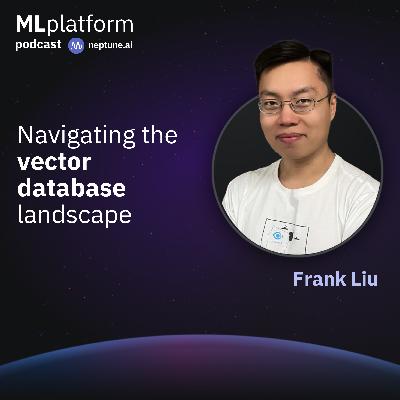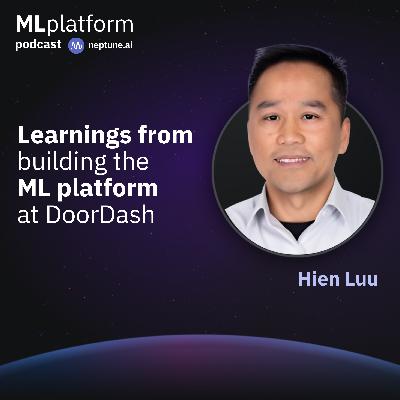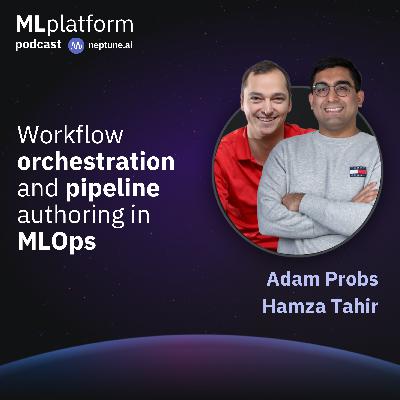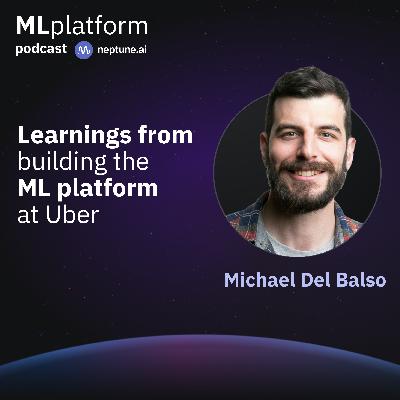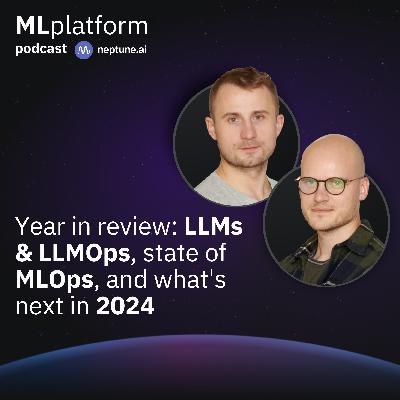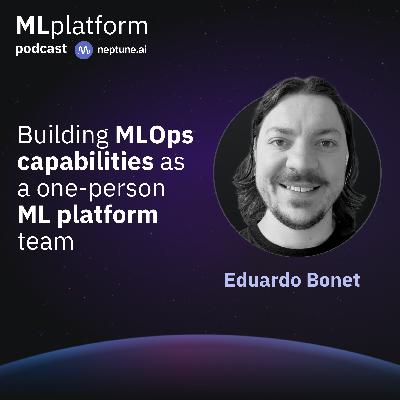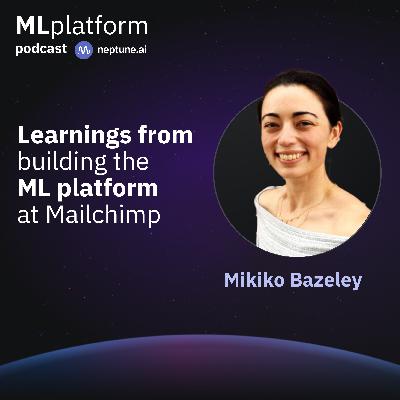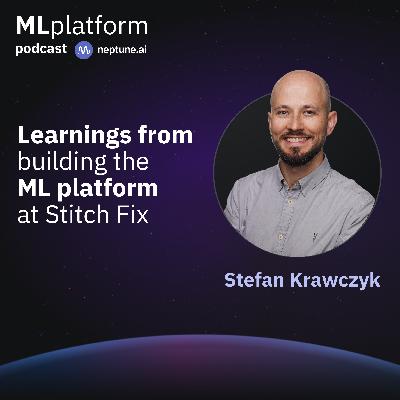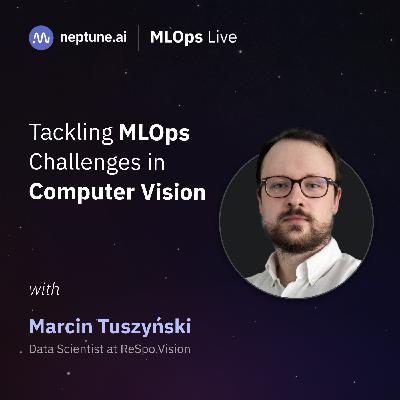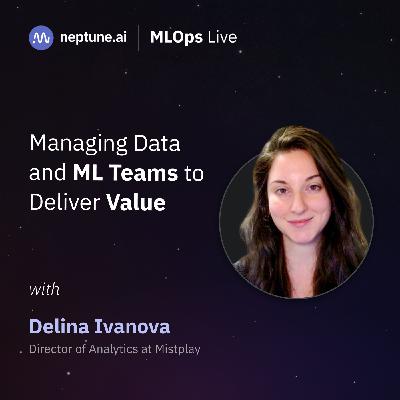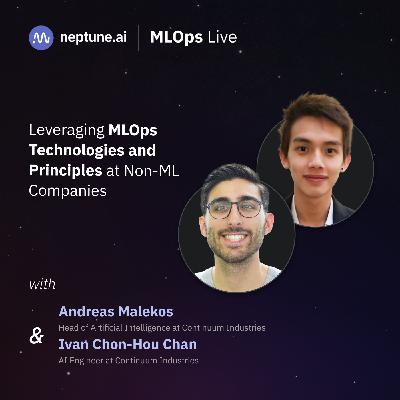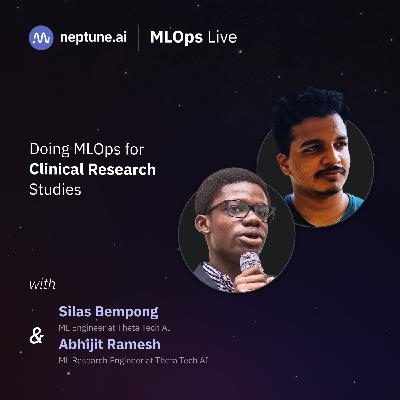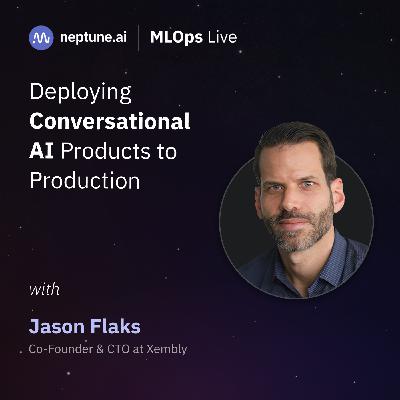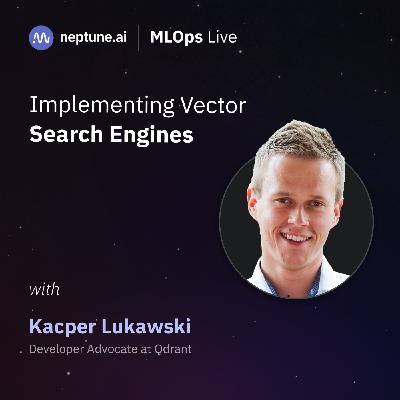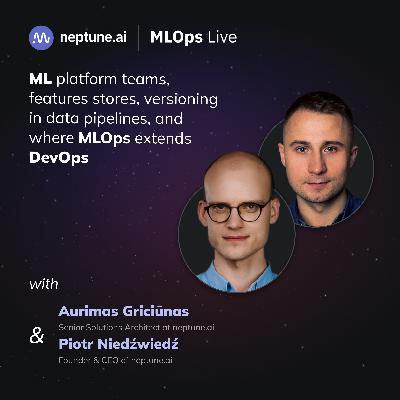Discover ML Platform Podcast
ML Platform Podcast

ML Platform Podcast
Author: neptune.ai
Subscribed: 25Played: 247Subscribe
Share
© neptune.ai
Description
Get behind-the-scenes insights into the world of internal ML platforms and MLOps stack components with Piotr Niedźwiedź and Aurimas Griciūnas in their show, where together with ML platform professionals, they discuss design choices, best practices, and real-world solutions to MLOps challenges.
Brought to you by neptune.ai.
Brought to you by neptune.ai.
40 Episodes
Reverse
On this episode of the ML Platform Podcast, Frank Liu discusses the basics, problems and challenges of vector databases, including indexing strategies, segmentation, vector lengths used in production, GPU-accelerated vector databases, potential use cases, and more.
On this episode of the ML Platform Podcast, Hien Luu talks about building the ML Platform at DoorDash, including big data models, building platforms at the enterprise level, centralized vs. decentralized ML platform teams, LLM strategy, MLOps in the shadow of LLMs, and more.
On this episode of the ML Platform Podcast, Adam Probs and Hamza Tahir discuss workflow orchestration and pipeline authoring in MLOps, focusing on ZenML's capabilities. They cover the main jobs-to-be-done, challenges behind testing integrations, ZenML’s role in end-to-end ML platforms, ZenML Cloud, the future of MLOps with LLMs, and more.
On this episode of the ML Platform Podcast, Chaoyu Yang discusses the MLOps stack's model serving, model registry and feature store components, online model training, large language model deployment, LLM agents, and more.
On this episode of the ML Platform Podcast, we have Olalekan Elesin as our guest. Olalekan shares insights on building the ML Platform at Scout24, including problems to be solved, reasons for going multi-cloud, point solutions vs. end-to-end platforms, data platforms vs. ML platforms, iterative product development approach, and more.
On this episode of the ML Platform Podcast, Mike Del Balso is our guest. Mike shares insights on his journey from Google to Tecton, building the ML platform (Michelangelo) at Uber, feature platforms, vector databases, and the future of the MLOps space in the world of foundational models.
On this special, end-of-the-year episode of the ML Platform Podcast, Piotr Niedzwiedzi and Aurimas Griciūnas discuss the state of MLOps and LLMOps, the impact of LLMs on layoffs and ML team composition, unsolved LLM challenges, use cases that don’t align with LLMs, MLOps and LLMOps predictions for 2024, and more.
With LLMs and AI being the center of discussion we also decided to experiment with generative AI for this video. Hope you don’t mind the experimentation.
On this episode of the ML Platform Podcast, we have Eduardo Bonet as our guest. Eduardo shares insights on the Staff Incubation Engineer’s work at GitLab, the relationship between MLOps and DevOps, the future of metadata tracking, CI/CD and ML model training pipelines, foundational (LLM) model metadata management, and more.
On this episode of the ML Platform Podcast, we have Mikiko Bazeley as our guest. Mikiko shares insights on the ML Platform at Mailchimp, including success stories and golden paths, team structures, templating, generative AI use cases, feedback monitoring, and more.
On this episode of the ML Platform Podcast, we have Stefan Krawczyk as our guest. Stefan shares insights on the ML Platform at Stitch Fix, including problems solved, success stories and golden paths, team structures and management, product management, feature requests, going open-source, and more.
In this episode of MLOps Live, Stephen and Sabine speak with Leanne Fitzpatrick, Director of Data Science at Financial TImes. Leanne leads a team of data scientists and engineers who are responsible for building data-driven products and solutions to support the company's journalism, marketing, and subscription efforts. Prior to Financial Times, she held leadership roles at TalkTalk, Hello Soda, and Callcredit Information Group.
In this episode of MLOps Live, Stephen and Sabine speak with Marcin Tuszyński, Data Scientist at ReSpo.Vision, a consulting firm that uses artificial intelligence to revolutionize football analysis. They discuss how AI and MLOps have revolutionized the way we look at football analytics and games, the ideal way to deal with large data sets, and the challenges that you are bound to face when building such a complex AI system.
In this episode of MLOps Live, Stephen speaks with David Hershey, Vice President at Unusual Ventures, a seed-stage venture capital firm offering hands-on support and expertise to startups on their early-stage journey. David was also previously a senior solutions architect at TechTun. Before TechTun, he worked as a solutions engineer at Determined AI and as a product manager for the ML platform at Ford Motor Company.
They discuss the impact of GPT-3 on MLOps, explore how language models have made machine learning more accessible, and the challenges of monitoring large language models.
In this episode of MLOps Live, Stephen and Sabine speak with Delina Ivanova, Director of Analytics at Mistplay, a loyalty platform for mobile gamers. Delina was also previously the Associate Director of Data and Insights at HelloFresh. This episode is centered around managing data and machine learning teams to deliver value.
In this episode of MLOps Live, Stephen and Sabine speak with Andreas Malekos, Head of Artificial Intelligence at Continuum Industries, and Ivan Chon-Hon Chan, AI Engineer at the same company. This week’s episode is centered around leveraging MLOps technologies and principles at non-ML companies. They delve into the chasm between their research science and engineering teams and how they solve it, the process of choosing the right MLOps tools, and how MLOps has significantly changed the structure of their teams.
In this episode of MLOps Live, Stephen and Sabine speak with Silas Bempong and Abhijit Ramesh, both Machine Learning Research Engineers at Theta Tech AI. This week’s episode is centered around doing MLOps for Clinical Research Studies. They delve into how AI and clinical research are a match made in heaven, how Theta Tech understands the MLOps workflow, and the elephant in the room - generative AI.
In this episode of MLOps Live, Sabine and Stephen speak with Jason Flaks, Co-founder and CTO at Xembly. Jason gives insight into deploying conversational AI products in production environments. He shares his background in music composition, Math, and Science before transitioning into software engineering. They discuss the two-stage pipeline of speech recognition systems, with Jason explaining conversational AI as building technology and products that are capable of interacting with humans in an unbounded conversational domain space. They go on to examine the complexities involved in deploying conversational AI products, such as describing the space in a way that machines can easily identify it and implementing such items with any necessary nuances or requirements. Jason elaborates on their stack of models for enabling speech-to-text conversion and for identifying distinct speakers in a given conversation.
In this episode of MLOps Live, Stephen and Sabine speak with Kacper Lukawski, a Developer Advocate at Qdrant. They discuss the applications vector search can be useful in; why vector search engines can be more useful than keyword search engines; and why teams should consider using it more often. They also delve into just how well vector search scales in production, as well as some of the best practices and tools for benchmarking vector search engines.
In this episode of MLOps Live, Piotr is joined by Aurimas Griciūnas, a Senior Solutions Architect at neptune.ai. Aurimas elaborates on the distinctions between machine learning (ML) platforms and data platform teams and the advantages of automating an ML stack. He also went over the process normalization requirements for streamlined teams from data platform and ML platform groups. Aurimas explains why data platforms are primarily concerned with displaying results, whereas ML platforms are centered on the frameworks and tooling that machine learning professionals use on a daily basis.
In this episode of MLOps Live, Stephen is joined by Itay Ben Haim, a software team lead at Superwise. Itay discusses the advantages of automating an ML stack and how it can give data scientists more time to innovate and develop solutions that generate business value and provide businesses with faster deployment of machine learning-based solutions. They identified multiple maturity levels in organizations: level 0, level 1, and level 2 or 3. Moving from Level 0 to Level 1 requires new skills such as a DevOps background, configuration files, Kubernetes, workflow managers, metadata stores, and low-latency databases.


